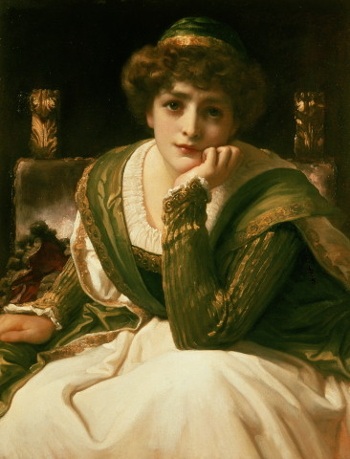Othello Contents
- Religious/ philosophical context
- Theatrical context
Desdemona, the innocent
 Innocence and vitality
Innocence and vitality
Desdemona is a young, innocent girl who has had a privileged and protected upbringing as the governor’s daughter. With a generous spirit and full of vitality, although socially sophisticated she is essentially innocent. As such she provides a stark contrast to most of the other characters of the play who are ‘men of the world’ or pragmatists (like Emilia).
Desdemona’s warm heart was captivated by Othello when she listened to his tales of adventure and near-death experiences. Once she has hinted of her feelings to Othello (she was far too modest to flirt openly at that stage), she joyfully accepts his proposal. Othello represents a new world of experiences and emotions to her, perhaps a way of breaking through the civilised constraints of her social circle. Above all, she wakes up to the power of true love.
Loyalty
Desdemona is rather like a younger version of Hermione in The Winter’s Tale. Both have the confidence within their marriages to be open and warm with other men, whilst being utterly faithful to their love for their husbands. Both are unjustly accused, despite being presented as absolutely morally pure, something which is reiterated by others. As Emilia says of her mistress in Act 5 Scene 2, Desdemona is ‘heavenly true’, ‘the sweetest innocent’ and ‘chaste’. Her only fault is to be ‘too fond’ of Othello.
It is her strong sense of loyalty which makes Desdemona plead with Othello that he reinstate Cassio. He had become a true friend to each of them when he acted as the messenger between them during their secret courtship. She has no idea that she is confirming the suspicions Iago has put in Othello’s mind that she is having an affair with Cassio. In all of this she does no wrong but only seeks to restore his lieutenant into Othello’s favour.
Female perfection?
Desdemona is associated with white, with a pearl and with the kind of descriptions usually used of the Virgin Mary. Yet she is also presented as very human. She banters with her maid and the men (for there is no other company) around her. Her youthful desire to experience the fullness of life means that she operated covertly to break free of her father. Girls of her class and era were regarded entirely as the possession of their parents, until they passed as chattels into the possession of their husbands. But Othello gives her space to speak, values the chance to be ‘free and bounteous to her mind’, allows her into a wider sphere of life as an equal and upholds her words before senior men.
Some critics argue that she clearly has the capacity for duplicity. As Brabantio warns Othello in Act 1 Scene 3:
Look to her, Moor, if thou hast eyes to see.
She has deceived her father, and may thee.
She has deceived her father, and may thee.
This thought comes back to haunt Othello when he begins to doubt her faithfulness. Desdemona also prevaricates about the loss of her handkerchief, even though it is only out of fear of what Othello might do or say if she confesses that she has mislaid it.
Goodness quenched
But Desdemona’s essential goodness remains undiminished. She is genuinely shocked when, probably for the first time in her life, she is hit in anger by someone she trusts. And she struggles to comprehend Emilia’s pragmatic take on marriage and her bitter desire to play men at their own game. Despite Othello’s accusations, she cannot imagine being false to the man she has married.
Her desire to uphold the man she loves extends beyond her life with him. On her death bed she falsely claims that she has killed herself, in order to protect Othello from the punishment he will suffer for murdering her. Such sacrificial love and forgiveness from her makes her all the more underserving of the cruelty that is wreaked upon her.
Mary, the mother of Jesus and wife of Joseph. It is traditionally understood that Mary was, and remained, a virgin during both the conception and birth of Jesus.
